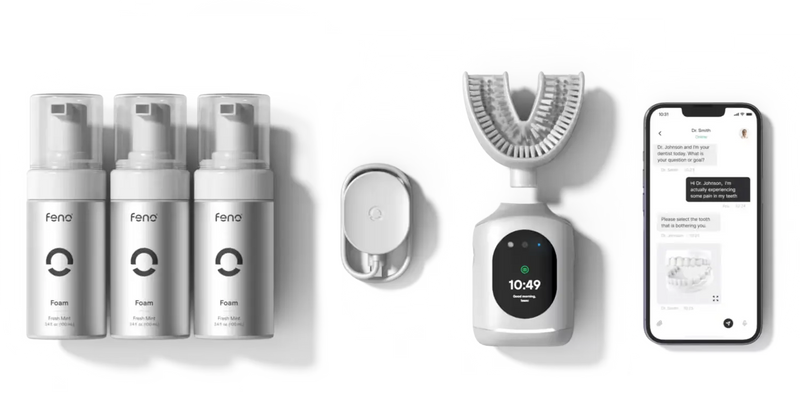
The Connection Between Autoimmune Disorders, Oral Health, and Vision: What You Need to Know
Essential Takeaways
- Five specific mouth symptoms can signal underlying autoimmune disorders that affect both oral and eye health, requiring prompt attention and specialized care.
I've seen patients whose mouth symptoms were the first indication of serious autoimmune conditions. What many don't realize is that your mouth often reveals hidden health issues long before other symptoms appear.
5 Warning Signs in Your Mouth That Require Immediate Attention
If you experience any of these oral symptoms, they could be signaling an underlying autoimmune disorder like Sjögren's syndrome:
-
Persistent Dry Mouth - When your mouth feels constantly dry despite adequate hydration, it could indicate your immune system is attacking salivary glands.
What to do: Track when symptoms occur and increase water intake immediately while scheduling a dental evaluation. -
Recurring Oral Ulcers - Painful sores that don't heal within two weeks may signal lupus, Crohn's disease, or other autoimmune conditions.
What to do: Document their appearance, location, and duration for your healthcare provider. -
Sudden Gum Inflammation - Unexplained bleeding or swollen gums that don't respond to improved oral hygiene could indicate an overactive immune response.
What to do: Request comprehensive periodontal screening at your next dental visit. -
Burning Mouth Sensation - A persistent burning feeling, especially on the tongue, without visible cause often accompanies autoimmune disorders.
What to do: Eliminate spicy foods and alcohol while seeking professional evaluation. -
Changes in Taste Perception - Sudden metallic taste or diminished taste sensation may indicate nerve involvement in autoimmune conditions.
What to do: Keep a food diary noting taste changes and discuss with your dentist and physician.
Understanding the Mouth-Eye Connection in Autoimmune Disorders
Autoimmune disorders occur when your immune system mistakenly attacks your own tissues. In Sjögren's syndrome specifically, the immune system targets moisture-producing glands, primarily affecting the salivary and tear glands. This creates a troubling link between oral and eye health that requires integrated care.
The statistics are alarming:
- Sjögren's syndrome affects approximately 4 million Americans
- Women account for 90% of Sjögren's cases
- The average time to diagnosis is 4.7 years from symptom onset
- Up to 50% of patients may have undiagnosed cases due to overlooking early warning signs
Why These Mouth Symptoms Often Connect to Eye Problems
When autoimmune conditions like Sjögren's syndrome are present, eye symptoms frequently accompany oral issues:
- Dry eyes - Affects over 90% of Sjögren's patients alongside dry mouth, creating a characteristic dual-symptom pattern
- Light sensitivity and grittiness - Reported by up to 75% of patients who also have oral symptoms
- Blurred vision - Often worsening in tandem with oral symptoms
- Increased risk of corneal damage - Requiring immediate attention to prevent permanent vision changes
What To Do If You Notice These Warning Signs
If you experience any of the 5 mouth symptoms mentioned above:
- Document everything - Keep a daily log of when symptoms occur and their severity
- Schedule a dental evaluation - Mention all symptoms specifically, as they may not seem connected to traditional dental issues
- Request specialized testing - Your dentist can perform simple saliva flow tests to help diagnose issues
- Seek multidisciplinary care - Ask for referrals to rheumatology and ophthalmology if appropriate
- Optimize your oral hygiene - Use advanced technology like the Feno Smartbrush for complete cleaning in just 20 seconds, especially crucial when saliva's protective effects are compromised
Prevention and Daily Management For At-Risk Individuals
As someone passionate about preventative oral health, I recommend these immediate actions:
- Upgrade your oral care routine - Traditional brushing often misses areas critical for those with autoimmune risks; the Feno Smartbrush's 18,000 bristles ensure complete coverage
- Increase hydration strategically - Sip water hourly and use sugar-free xylitol products to stimulate remaining saliva production
- Monitor pH levels - Use home testing kits to check oral acidity, which increases with reduced saliva
- Add moisture-preserving habits - Use a humidifier at night and avoid mouth breathing
- Implement anti-inflammatory nutrition - Reduce processed foods and increase omega-3 rich foods
Why Early Detection Through Oral Symptoms Is Critical
The statistics are sobering: the average time from first symptom to autoimmune diagnosis is 4.7 years. During this time, irreversible damage can occur.
At Feno, we believe monitoring your oral health is a critical window into detecting systemic conditions early. That's why the Feno Smartbrush not only cleans more effectively in just 20 seconds, but its scanning technology helps track changes in your oral health over time—potentially identifying issues before they become severe.
Remember: These 5 mouth symptoms require immediate attention, not "wait and see" approach. Your proactive response could be the difference between manageable symptoms and progressive disease.
If you're experiencing any of these warning signs, don't delay seeking care. Early intervention makes all the difference in autoimmune management.

Feno Founders Edition Bundle
Advanced Oral Health in 20 Seconds with the Feno Smartbrush™
Get Yours Now!



